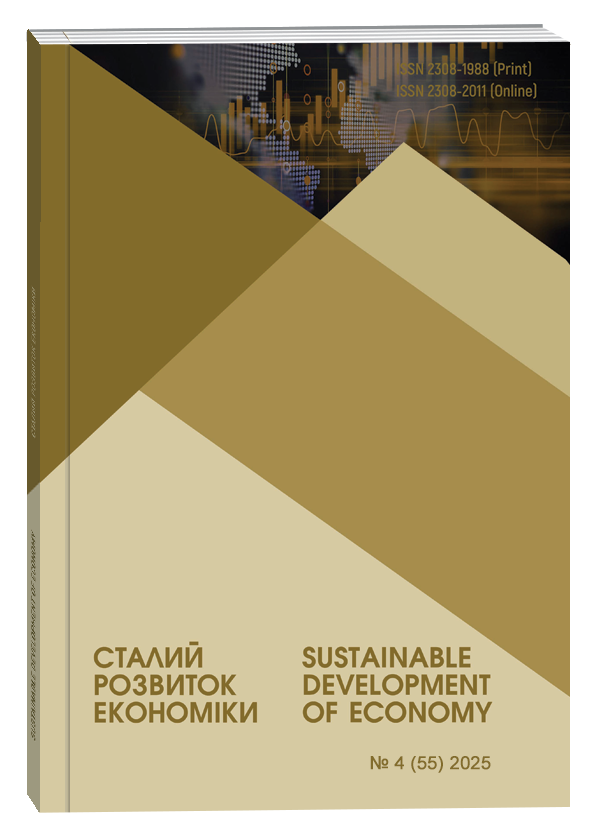THE ECONOMIC APPROACH TO LIFE STRATEGY OPTIMIZATION
Abstract
This paper examines the economic problem of effectively managing the value of human capital and the overall life satisfaction of an economic agent by optimizing the choice of effort and education levels, depending on the agent’s innate abilities. Every individual (economic agent) seeks to manage their life in a way that maximizes overall satisfaction from living. In economic modeling, this life satisfaction is often represented as the present value of lifetime utility, which reflects the agent’s level of consumption over the life cycle, adjusted for the disutility (or discomfort) arising from the continuous effort required to generate that stream of consumption. Individuals are born with different levels of innate abilities and endowments that evolve throughout life as they accumulate experience and skills, and as they choose their educational trajectory, which further affects their labor productivity through the acquisition of additional knowledge. Thus, at a young age, the economic agent is interested in solving an optimization problem of effort allocation that maximizes the lifetime utility function. All factors influencing an agent’s labor productivity determine their wage level and corresponding consumption level, both of which evolve dynamically throughout life. Therefore, each economic agent seeks to optimally balance their effort while accounting for the burnout effect, so that their life trajectory maximizes overall life satisfaction. The study demonstrates how numerical optimization methods can be employed to solve complex dynamic programming problems corresponding to a wide range of economic models addressing the issues of optimal intertemporal behavior of economic agents over long horizons, taking into account their abilities, experience, and exerted efforts. The study places particular emphasis on deriving the optimal life strategy for economic agents with low initial endowments, given their ability endowments, and develops policy-relevant recommendations aimed at enhancing the value of their human capital. The paper demonstrates how the specification of alternative models of the income function and the cost of effort, as well as the inclusion of burnout effects resulting from excessive effort, shape the diversity of behavioral patterns exhibited by economic agents over the life cycle.
References
Stokey N., Lucas R., Prescott E. (1989) Recursive Methods in Economic Dynamics Cambridge, MA: Harvard University Press. URL: https://groupdocs.vip/look-up/gA02DE/603420/4982160-recursive-methods-in-economic-dynamics
Fan X., Seshadri А., Taber С. (2024) Estimation of a Life Cycle Model with Human Capital, Labour Supply, and Retirement. Journal of Political Economy, vol. 132(1), pp. 48-95. DOI: https://doi.org/10.1086/726232
Deming D., Silliman M. (2025) Skills and Human Capital in the Labor Market. Handbook of Labor Economics, vol. 6, pp. 115-152. DOI: https://doi.org/10.3386/w32908
Hai, R., Heckman, J. (2017) Inequality in Human Capital and Endogenous Credit Constraints. Review of Economic Dynamics, vol. 25, pp. 4-36, DOI: https://doi.org/10.1016/j.red.2017.01.001
Papageorge N., Thom, K. (2018) Genes, Education, and Labor Market Outcomes: Evidence from the Health and Retirement Study. Journal of the European Economic Association, vol. 18(3), pp. 1351-1399. DOI: https://doi.org/10.3386/w25114
Cunha F., Heckman J. (2009) The Economics and Psychology of Inequality and Human Development. Journal of the European Economic Association, vol. 7(2-3), pp. 320-364. DOI: https://doi.org/10.1162/JEEA.2009.7.2-3.320
Heckman J., Stixrud J., Urzua S. (2006) The Effects of Cognitive and Noncognitive Abilities on Labor Market Outcomes and Social Behavior. Journal of Labor Economics, vol. 24, № 3. DOI: https://doi.org/10.1086/504455
Pastorino E. (2024) Careers in Firms: The Role of Learning about Ability and Human Capital Acquisition. Journal of Political Economy, vol. 132 (6). DOI: https://doi.org/10.1086/728454
Greiner A. (2008) An economic model of work related stress. Journal of Economic Behavior & Organization, vol. 66(2), pp. 335–346. DOI: https://doi.org/10.1016/j.jebo.2006.12.001/
Aghion, P., Bergeaud, A., Blundell, R., Griffith, R. (2023) Social Skills and the Individual Wage Growth of Less Educated Workers. IZA Discussion Paper No. 16456. URL: https://www.iza.org/publications/dp/16456/social-skills-and-the-individual-wage-growth-of-less-educated-workers
Stokey N., Lucas R., Prescott E. (1989) Recursive Methods in Economic Dynamics Cambridge, MA: Harvard University Press. Available at: https://groupdocs.vip/look-up/gA02DE/603420/4982160-recursive-methods-in-economic-dynamics
Fan X., Seshadri А., Taber С. (2024) Estimation of a Life Cycle Model with Human Capital, Labour Supply, and Retirement. Journal of Political Economy, vol. 132(1), pp. 48-95. DOI: https://doi.org/10.1086/726232
Deming D., Silliman M. (2025) Skills and Human Capital in the Labor Market. Handbook of Labor Economics, vol. 6, pp. 115-152. DOI: https://doi.org/10.3386/w32908
Hai, R., Heckman, J. (2017) Inequality in Human Capital and Endogenous Credit Constraints. Review of Economic Dynamics, vol. 25, pp. 4-36, DOI: https://doi.org/10.1016/j.red.2017.01.001
Papageorge N., Thom, K. (2018) Genes, Education, and Labor Market Outcomes: Evidence from the Health and Retirement Study. Journal of the European Economic Association, vol. 18(3), pp. 1351-1399. DOI: https://doi.org/10.3386/w25114
Cunha F., Heckman J. (2009) The Economics and Psychology of Inequality and Human Development. Journal of the European Economic Association, vol. 7(2-3), pp. 320-364. DOI: https://doi.org/10.1162/JEEA.2009.7.2-3.320
Heckman J., Stixrud J., Urzua S. (2006) The Effects of Cognitive and Noncognitive Abilities on Labor Market Outcomes and Social Behavior. Journal of Labor Economics, vol. 24, № 3. DOI: https://doi.org/10.1086/504455
Pastorino E. (2024) Careers in Firms: The Role of Learning about Ability and Human Capital Acquisition. Journal of Political Economy, vol. 132 (6). DOI: https://doi.org/10.1086/728454
Greiner A. (2008) An economic model of work related stress. Journal of Economic Behavior & Organization, vol. 66(2), pp. 335–346. DOI: https://doi.org/10.1016/j.jebo.2006.12.001/
Aghion, P., Bergeaud, A., Blundell, R., Griffith, R. (2023) Social Skills and the Individual Wage Growth of Less Educated Workers. IZA Discussion Paper No. 16456. Available at: https://www.iza.org/publications/dp/16456/social-skills-and-the-individual-wage-growth-of-less-educated-workers


